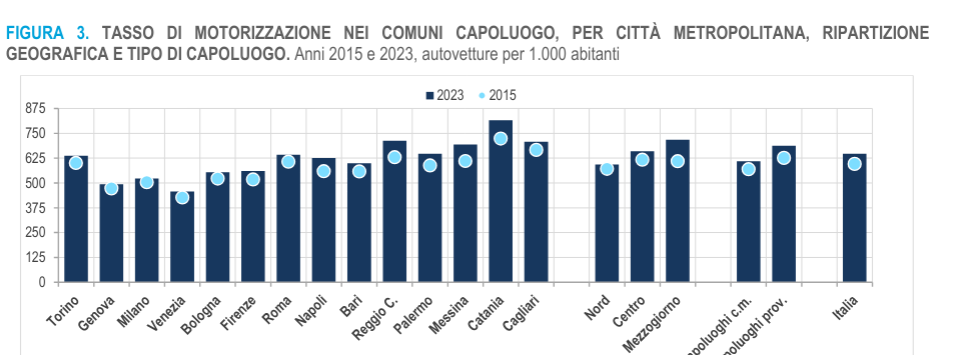Italy is a car infested country. I would love to know impressions of fellow users from other countries that visit Italy: do you see this?
We rank in the low part for public transport and rails (except high-speed trains). Which is not surprsing
Moreover, automotive industry is sinking in Italy, so there is not even the justification of helping “economy”, for pushing on cars so much.
Finally, there are many more cars than car licenses in Italy. Which, IMHO, is completely absurd
Cross-posted from: https://mastodon.uno/@rivoluzioneurbanamobilita/113632796547131119
It’d be interesting to see it by weight of those cars. My impression is that Italy has a lot of really small cars, while we here in Sweden have a lot of the US-style Emotional Support Vehicles
Was just watching a live stream of Piazza Venezia (in Rome) and there was bumper to bumper traffic made up of mostly “regular sized cars”.
But it was such a joy to see Vespas, e-scooters, and bikes filter though that mess like it was nothing!
Traffic is only a car problem.
Could also be a capital thing, which is why I’m curious. Cycling some of our streets here in Stockholm is definitely like, “oh, you had the idea to fit that thing in here” at all the drivers.
Latvia is in last place 🥳
Hello lemmy, in Italy there are lots of car enthusiasts who own old cars and mostly don’t drive them. Don’t think that it is only a rich thing. Most of the boomers tend to keep the old cars of their parents and drive them from time to time only to keep them functional. Also lots of hunters don’t go driving in cities with off road vehicles just to show off. They have a small car for city, a small 4x4 for hunting and a small three wheels pick up (l’Ape Piaggio) for hauling cargos. Also fuck euro 7, let the polluting companies pay the price not us! BTW I’m a bike enthusiast in Italy who commutes everyday in bike and I would love to have bike lanes in Italy but in most old steep and narrow street is impossible. We just have to make bike lanes in parks and fuck those pedestrians! Get some wheels! The only problem now is to find small cars: nowadays I tend to see even more emotional pickups like the ford ranger and they are ruining city streets and country roads. Fatevi un ape, tanto la nerchia rimane sempre uguale
This data, especially the second graph, is surprising and needs explanation.The trend in transport mode in major cities, i.e. where most people live, is clearly away from cars in recent years.Correction: I misunderstood, this is ownership not modal share. Sorry.
So car share is increasing in italian cities too, as you can see in the following plot. Reality is that when there is no alternative, people will use cars. This is visibile for example by the facr that Milan is the city with best publc transit, while cities inbthe south are pretty bad

Very surprising and pretty shameful for Italy.
In Paris, car use has been dropping continuously for decades. In recent years the trend has even accelerated. In Copenhagen: forget transit, well over a third of all trips are by bicycle.
This is car ownership, not car use. While there is some correlation (if you have a car you’re more likely to use it) I think it reflects purchasing power rather than preferred transportation choice.
That explains it! My bad.
I was just reading an article yesterday in the Australia Financial Review (paywalled) with a few Aussie’s who emigrated to Italy, 2 retirees, one a younger family, and they all commented that the public transport was so much better and so cheap compared to Australia and they didn’t need to own a car.
https://www.afr.com/wealth/personal-finance/so-you-want-to-retire-to-tuscany-20241128-p5ku92
How bad is Australia :(
Public transport around Napoli and Caserta is ok, but the car traffic is heavy. Driving in Italy is terrible though, traffic laws are more of suggestions.
As a visitor to milano, i had a really great time getting around on foot and metro. Also took rail to the alps and high speed train to torino. Italy is way less carbrained than north america
Also, a lot more scooters, motorcycles, and really tiny cars. So the roads feel safer compared to north america
If you tried to get out of Milan city proper your opinion of the transports wouldn’t be as good.
Regional transport is not as well integrated specially outside of major cities.
going to lecco, varenna, torino doesn’t count as getting out of milan city proper?
i know the system isn’t perfect, and plenty of locals complained about transit… but coming from a north american perspective italy has so much more transit options than we have here (both regionally and within the city)
Referring mostly for commuters. Regional trains are very busy and generally not well maintained.
Trenord the private operator doesn’t do a good job. Trains are frequently late, packed and dirty
If you go outside the Rush hour it might be okay but at Rush hour it’s a different story.
Of course if you compare to a City that has no or very limited transport options there’s no comparison.
Any reason why the Netherlands (a.k.a. Holland, a.k.a. Olanda in Italian) isn’t on the list? It would be interesting to know how they compare.
Because it’s called with the (I think) coresct name “Paesi Bassi” 😉
You’re right! In that case, I’m more surprised that Paesi Bassi are as high as they are!
Lots of cars under “blocco amministrativo” for not paying taxes, can’t be driven, can’t be sold lol
Interesting that the Netherlands (Paesi Bassi) is so high. Like a solid 10% higher than Sweden, and in Sweden we have shit bike lanes. We haven’t invested in our public transportation since the 80s, only having a few capacity expansion projects for our overloaded commuter rail.
It is also about how expensive cars are. If it is relatilvy cheap, you might well consider buying a second one, have a car basically not used and so forth.
My guess: cultural proximity to Germany, whose national identity is based on engineering and in particular the internal combustion engine.
I think the only problem with this graph is that it’s per 1000, which can skew a couple of results.
Sure if your population is high it’s fine, but if it’s say 5 million people total, like Finland, then it’ll be off
I don’t understand why the unit car/1000 people would be a problem.
How is Finland off here?
Because it’s basically a non-standardized percentage.
Something like per-capita would be more accurate, since that factors in each individual there is in the population.
The other issues are: how often the cars are used / are they in use, how much public transportation exists, and percentage of the population using public transportation vs private vehicle. Italy for example was one of the earliest automaker countries, so it’s likely a significant amount of people there have legacy vehicles that aren’t allowed in public roads - essentially museum pieces. Legacy vehicles can make a country look like it’s doing worse in public transportation than it actually is as well.
That’s why the best measurement for progress in this would be percentage use of public transportation / non-automobile use, maybe in combination with population living in rural zones as well (so that more rural countries don’t look worse than they are).
The difference between per capita and / 1000 is a factor of 1000. It has the same result visually. Also you’re trying to fit a lot of data into one graph, if you want people to understand it it has to be easy to understand.




